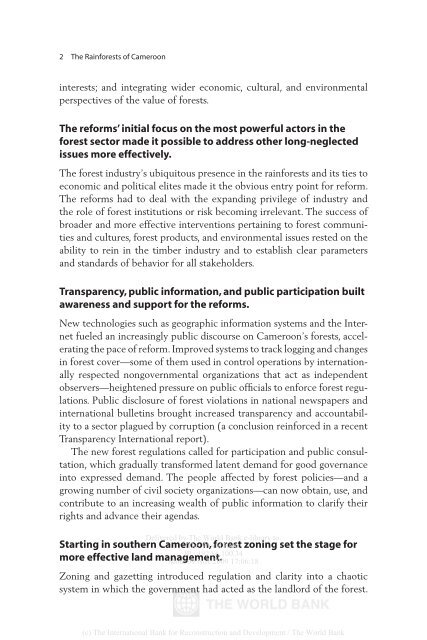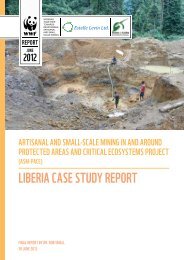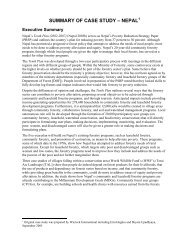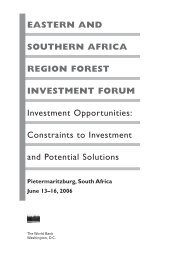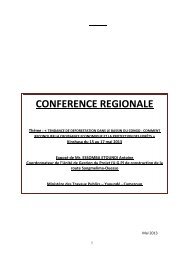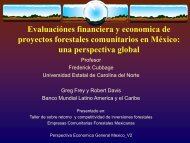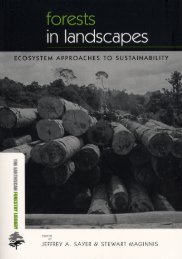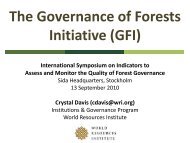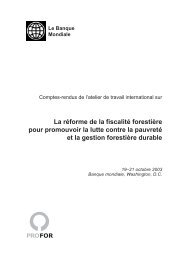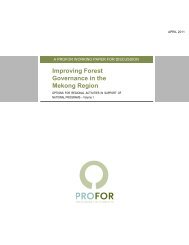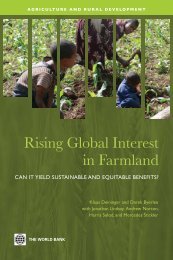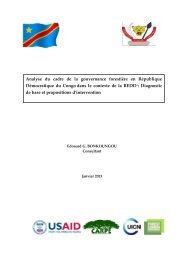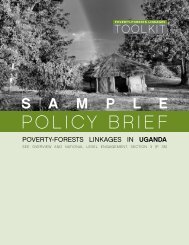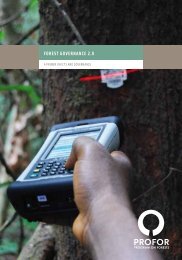The Rainforests of Cameroon - PROFOR
The Rainforests of Cameroon - PROFOR
The Rainforests of Cameroon - PROFOR
- No tags were found...
You also want an ePaper? Increase the reach of your titles
YUMPU automatically turns print PDFs into web optimized ePapers that Google loves.
2 <strong>The</strong> <strong>Rainforests</strong> <strong>of</strong> <strong>Cameroon</strong>interests; and integrating wider economic, cultural, and environmentalperspectives <strong>of</strong> the value <strong>of</strong> forests.<strong>The</strong> reforms’ initial focus on the most powerful actors in theforest sector made it possible to address other long-neglectedissues more effectively.<strong>The</strong> forest industry’s ubiquitous presence in the rainforests and its ties toeconomic and political elites made it the obvious entry point for reform.<strong>The</strong> reforms had to deal with the expanding privilege <strong>of</strong> industry andthe role <strong>of</strong> forest institutions or risk becoming irrelevant. <strong>The</strong> success <strong>of</strong>broader and more effective interventions pertaining to forest communitiesand cultures, forest products, and environmental issues rested on theability to rein in the timber industry and to establish clear parametersand standards <strong>of</strong> behavior for all stakeholders.Transparency, public information, and public participation builtawareness and support for the reforms.New technologies such as geographic information systems and the Internetfueled an increasingly public discourse on <strong>Cameroon</strong>’s forests, acceleratingthe pace <strong>of</strong> reform. Improved systems to track logging and changesin forest cover—some <strong>of</strong> them used in control operations by internationallyrespected nongovernmental organizations that act as independentobservers—heightened pressure on public <strong>of</strong>ficials to enforce forest regulations.Public disclosure <strong>of</strong> forest violations in national newspapers andinternational bulletins brought increased transparency and accountabilityto a sector plagued by corruption (a conclusion reinforced in a recentTransparency International report).<strong>The</strong> new forest regulations called for participation and public consultation,which gradually transformed latent demand for good governanceinto expressed demand. <strong>The</strong> people affected by forest policies—and agrowing number <strong>of</strong> civil society organizations—can now obtain, use, andcontribute to an increasing wealth <strong>of</strong> public information to clarify theirrights and advance their agendas.Delivered by <strong>The</strong> World Bank e-library to:Starting in southern <strong>Cameroon</strong>, <strong>The</strong> World forest Bank zoning set the stage forIP : 192.86.100.34more effective land management.Mon, 09 Nov 2009 17:06:18Zoning and gazetting introduced regulation and clarity into a chaoticsystem in which the government had acted as the landlord <strong>of</strong> the forest.(c) <strong>The</strong> International Bank for Reconstruction and Development / <strong>The</strong> World Bank


